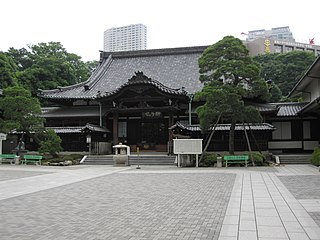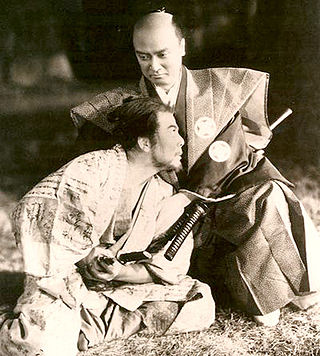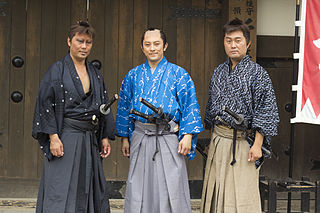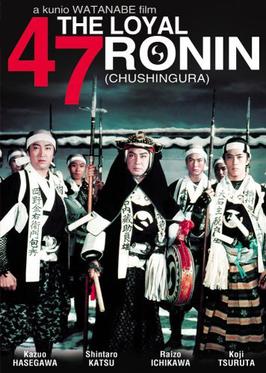See also
- The Loyal Ronins , a historical novel by Tamenaga Shunsui, translated into English by Edward Greey and Shinichiro Saito in 1880
Forty-seven Ronin refers to a case involving the samurai code of honor.
Forty-seven Ronin may also refer to:

In feudal Japan (1185–1868), a rōnin was a type of samurai who had no lord or master and in some cases, had also severed all links with his family or clan. A samurai becomes a rōnin upon the death of his master, or after the loss of his master's favor or legal privilege.

The revenge of the forty-seven rōnin, also known as the Akō incident or Akō vendetta, is a historical event in Japan in which a band of rōnin avenged the death of their master on 31 January 1703. The incident has since become legendary. It is one of the three major adauchi vendetta incidents in Japan, alongside the Revenge of the Soga Brothers and the Igagoe vendetta.

Rie Miyazawa is a Japanese actress and former teen idol, modeling for hundreds of photo shoots. She is regarded as one of Japan's top actresses, and her accolades include six Japan Academy Film Prizes and three Kinema Junpo Awards.

Sengaku-ji (泉岳寺) is a Buddhist temple belonging to the Sōtō school of Japanese Zen located in the Takanawa neighborhood of Minato-ku, near Sengakuji Station and Shinagawa Station, Tokyo, Japan. It was one of the three major Sōtō temples in Edo during the Tokugawa shogunate, and became famous through its connection with the Akō incident of the forty-seven Rōnin in the 18th century.

Ōishi Yoshio was the chamberlain (karō) of the Akō Domain in Harima Province, Japan. He is known as the leader of the Forty-seven Rōnin in their 1702 vendetta and thus the hero of the Chūshingura. He is often referred to by his title, Ōishi Kuranosuke (大石内蔵助).
A rōnin is a Japanese feudal samurai without a master.

The 47 Ronin is a black-and-white two-part jidaigeki Japanese film directed by Kenji Mizoguchi, adapted from a play by Seika Mayama. The first part was released on December 1, 1941 with the second part being released on February 11 of the following year. The film depicts the legendary forty-seven Ronin and their plot to avenge the death of their lord, Asano Naganori, by killing Kira Yoshinaka, a shogunate official responsible for Asano being forced to commit seppuku.
Chūshingura is the title given to fictionalized accounts in Japanese literature, theater, and film that relate to the historical incident involving the forty-seven rōnin and their mission to avenge the death of their master, Asano Naganori. Including the early Kanadehon Chūshingura (仮名手本忠臣蔵), the story has been told in kabuki, bunraku, stage plays, films, novels, television shows and other media. With ten different television productions in the years 1997–2007 alone, Chūshingura ranks among the most familiar of all historical stories in Japan.

Chanbara (チャンバラ), also commonly spelled "chambara", meaning "sword fighting" films, denotes the Japanese film genre called samurai cinema in English and is roughly equivalent to Western and swashbuckler films. Chanbara is a sub-category of jidaigeki, which equates to period drama. Jidaigeki may refer to a story set in a historical period, though not necessarily dealing with a samurai character or depicting swordplay.

Chushingura 1/47 (忠臣蔵1/47) is a 2001 Japanese historical film based on the kabuki tale of the Forty-seven Ronin. The film was made for the Fuji TV Network and was directed by Shunsaku Kawamo.
Daichūshingura (大忠臣蔵) is a Japanese television dramatization of the events of the Forty-seven Ronin. The first episode aired on January 5, 1971, and the 52nd and final episode appeared on December 28 of the same year. The NET network broadcast it in the Tuesday evening 9:00–9:56 prime-time slot in Japan.

The Loyal 47 Ronin is a 1958 color jidaigeki Japanese film directed by Kunio Watanabe. With box office earnings of ¥410 million, it was the most successful film of 1958 in Japan. Furthermore, it was the second-highest-grossing film of the 1950s in Japan.

Chūshingura: Hana no Maki, Yuki no Maki is a 1962 Japanese jidaigeki epic film directed by Hiroshi Inagaki, with special effects by Eiji Tsuburaya. Produced and distributed by Toho Studios, it is based on the story of the forty-seven rōnin. The film stars Toshiro Mifune as Genba Tawaraboshi, along with Matsumoto Hakuō I, Yūzō Kayama, Tatsuya Mihashi, Akira Takarada, Yosuke Natsuki, Makoto Satō, and Tadao Takashima.
The Edo period of the history of Japan is the setting of many works of popular culture. These include novels, stage plays, films, television shows, animated works, manga, and video games. Major events of the period, such as the Siege of Osaka, Shimabara Rebellion, and the decline and fall of the Tokugawa shogunate figure prominently in many works. Historical and fictional people and groups of the period, including Miyamoto Musashi, Izumo no Okuni, Yagyū Jūbei Mitsuyoshi, the fictional Isshin Tasuke, Yui Shōsetsu, Matsuo Bashō, Tokugawa Mitsukuni, Ōoka Tadasuke, Tōyama Kagemoto, the Forty-seven Ronin, Sakamoto Ryōma, Katsu Kaishū, and the Shinsengumi, as well as the fifteen Tokugawa shoguns were active for much or all of their public lives and are dramatized in works of popular culture. The cultural developments of the times, including kabuki, bunraku, and ukiyo-e, and practices like sankin kōtai and pilgrimages to the Ise Shrine, feature in many works set in Edo Japan.
Akō Rōshi is a 1961 color Japanese film about the 47 Ronin directed by Sadatsugu Matsuda. It earned ¥435 million at the annual box office, making it the second highest-grossing film of 1961. Ako Roshi was produced by Toei, and Shigeru Okada. It is based on the novel written by Jiro Osaragi.
Samurai Vendetta is a 1959 Japanese chambara film directed by Kazuo Mori starring Raizo Ichikawa and Shintaro Katsu that was originally released by Daiei Film. It is a depiction of the early years of the samurai Horibe Yasubei, who was one of the Forty-seven Ronin. The film is also known as Chronicle of Pale Cherry Blossoms, a poetic reference to the Forty-Seven Ronin.

47 Ronin is a 2013 American fantasy action film directed by Carl Rinsch in his directorial debut. Written by Chris Morgan and Hossein Amini from a story conceived by Morgan and Walter Hamada, the film is a work of Chūshingura ; a fictionalized account of the forty-seven rōnin, a real-life group of masterless samurai under daimyō Asano Naganori in 18th-century Japan who avenged Naganori's death by battling his rival Kira Yoshinaka. Starring Keanu Reeves, Hiroyuki Sanada, Tadanobu Asano, Rinko Kikuchi and Ko Shibasaki, the film bears little resemblance to its historical basis compared to previous adaptations, and instead serves as a stylized interpretation set "in a world of witches and giants."

47 Ronin is a 1994 Japanese film directed by Kon Ichikawa. The film is another version of the Chūshingura, the story of the revenge of the forty-seven rōnin of Ako against Lord Kira.
47, '47 or forty-seven may refer to:
Akō Rōshi refers to the forty-seven rōnin.